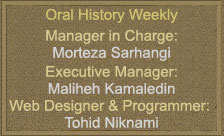| No. 503 | 14 September 2021 |
An interview with former commander of the 16th Armored Division of Qazvin – 2The leader of the Islamic Revolution Ayatollah Khamenei stated, “Our army is a revolutionary army. There are lots of things inside you which you can’t find in others. You are an army which fought for the sake of your country for ten years. Few armies in the world have such a feature. There are many armies that have not stood in these crises and have not given such an exam to the people; the pious ...Excerpts from the memoirs of Seyed Ahmad ZarhaniOn the Day 31st Shahrivar 1359 (22nd September 1980)In the summer of 1980, a member of the Islamic Association of the Dezful Vahdati Base reported: "Iraqi plane MIG has been appearing in Dezful for several days. The defense could shoot them, but the base commander preferred not shoot them. When the MIGs were gone, permission to fire was issued and our expensive ammunition is wasted." He added: "Meanwhile, the commander has planted poppies in the garden in front of his house and he does not fear to meet someone."Kobra Nemati Tells of Memories of SchoolI entered education in Aban (October or November) 1979. I taught sociology and mostly religious sciences early, but when the war broke out, I was principal of Tarbiat High School and also principal of night High School of Parvin Etesami. Before the war began, there was news that Iraqis had come to the border. The first martyr of Ilam, Ruhollah Shanbei, was a Pasdar (force of IRGC) who died a martyr on the border.One Photo and Three MemoriesAfter Imam Khomeinis opposition to the bill of state and provincial associations and the reforms proposed by the Pahlavi government, known as the White Revolution and the referendum on January 26th, 1962, and Imam Khomeinis fierce confrontations with the Shah and the Pahlavi regime, Pahlavi forces arrested him at dawn on June 6, 1963. The Pahlavi government found a way to deal directly with Imam Khomeini, who had enjoyed great fame, popularity, and fortune among the Iranian people. Oral History Weekly Magazine Aims and Regulations
Oral History Weekly Magazine wishes to create a suitable place for thoughts and idea development; Its main field would be “Oral History” and subjects as telling & writing memoirs, writing diaries, travelogues, chronologies, and all other subfields of history which are presented in the form of news, articles, reports, notes, interviews and memoirs can be included. There is no limitation on the length of would-be-sent materials. Mentioning the name, academic background and email is necessary. Articles with complete references and bibliography are more credited and an abstract would quite helpful. Weekly is not about to publish any material consisting insults and libels about other people or anything that brings anxiety to public opinion. Weekly can edit and translate the received materials. The published articles and materials are only the writer’s ideas and Oral History Weekly Magazine has no responsibility about their content. |
 SABAH (75) Memoirs of Sabah Vatankhah Interviewed and Compiled by Fatemeh Doustkami Translated by Natalie Haghverdian Published by Soore Mehr Publishing Co. Persian Version 2019 *** Ebika company was between Sarbandar and Mahshahr, right after the camp B station. As Saleheh said Ebika was a company for foreigners that army took charge after revolution and start of war. I asked Saleheh to take me to the company to visit her friends. I knew some of her friends prior to the war. Robab and Sakineh Hoursi, Fatemeh Deyhim, Banouyi, Kobra Aref Zadeh and Fatemeh and Narges Bandari were those individuals I knew. Saleheh accepted.    |
